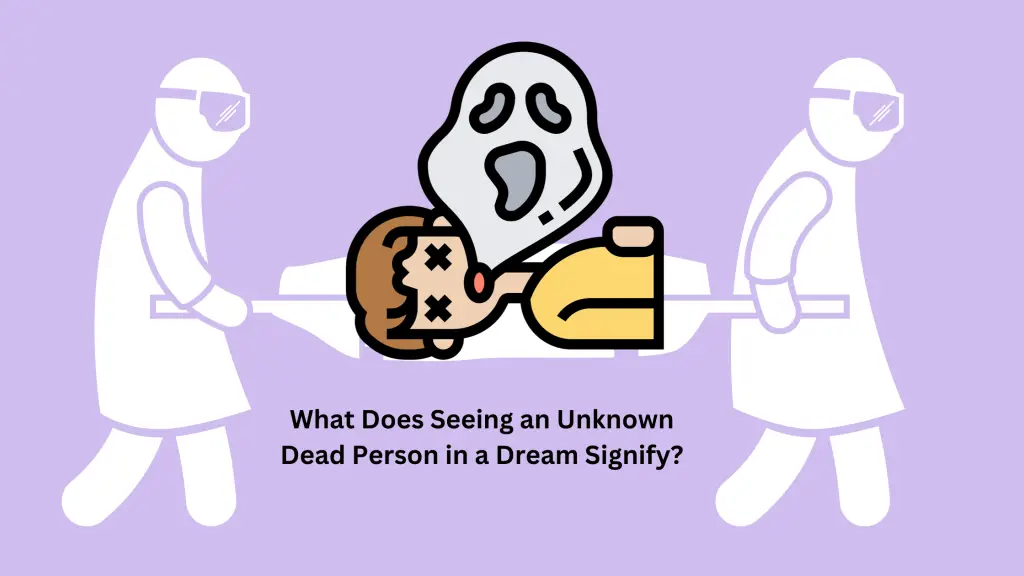Dreams have intrigued and fascinated human beings for centuries. Often, dreams are seen as reflections of our subconscious mind and can provide valuable insights into our thoughts, emotions, and experiences.
But do dreams have meaning, especially when they involve seeing an unknown dead person? This article aims to explore the significance behind such dreams and what they might symbolize.
When it comes to dreaming of dead people, the symbolism can vary depending on the context and the identity of the deceased. Seeing a dead person in a dream can symbolize various aspects, including unresolved grief, unfinished business, or the need for closure.
However, when the dead person is unknown, it adds an extra layer of mystery to the interpretation.
In the realm of dream analysis, there are common interpretations of seeing an unknown dead person. It can represent a part of ourselves that we have disconnected from or repressed.
It may also symbolize the fear of the unknown or the impending changes in our lives. Exploring these interpretations can offer valuable insights into our psychological and emotional state.
Furthermore, cultural and spiritual beliefs play a significant role in the interpretation of dreaming about dead persons. Different cultures have their own interpretations, associating dream characters with messages from the spirit world or ancestors.
Exploring these cultural interpretations can contribute to a comprehensive understanding of the dream’s significance.
Key Takeaways
1. Seeing a dead person in a dream can symbolize subconscious fears, anxieties, and unresolved emotions.
2. The identity of the dead person in the dream may hold significance and provide insight into the specific interpretation.
3. Dreaming of an unknown dead person can have various common interpretations, such as unresolved issues or the need for closure.
4. Dreams about dead persons can serve as a way to process grief and loss on a subconscious level.
5. Cultural interpretations and spiritual beliefs vary regarding dreaming of dead persons, providing different perspectives.
6. It is essential to understand personal context and emotions when interpreting dream symbols.
7. Keeping a dream journal can help identify patterns and gain insights into the symbolism within dreams.
Interpreting Dreams
Interpreting Dreams can be an intriguing and enigmatic pursuit. While dreams are subjective experiences, they possess the potential to reveal insights into our subconscious thoughts, emotions, and desires. Here is some guidance to keep in mind when interpreting dreams:
1. Symbols and imagery: Dreams often employ symbols and imagery to convey messages. It is essential to pay attention to recurring symbols or themes in your dream, as they may carry significant meaning for you.
2. Emotional content: Take note of the emotions you experienced during the dream. Emotions in dreams can mirror our waking life feelings, unresolved issues, or concealed fears.
3. Personal context: When analyzing your dream, consider your personal experiences, beliefs, and relationships. Dreams are unique to each individual, so what may hold significance for one person may not hold the same meaning for another.
4. Patterns and connections: Seek out patterns or connections between your dreams and your waking life. At times, dreams can provide clarity or offer insights into situations or issues you are presently confronting.
5. Reflect on your waking life: Maintain a dream journal and regularly reflect on your dreams. Eventually, you may begin to recognize patterns or recurring themes that can assist you in gaining a deeper understanding of your dreams.
Remember that interpreting dreams is a subjective process, and there are no definitive guidelines or rules. It is crucial to rely on your intuition and personal insight when exploring the meanings behind your dreams.
By attentively observing the symbols, emotions, and patterns in your dreams, you can obtain valuable insights into your subconscious mind and personal well-being.

Symbolism of Dead Persons in Dreams
The symbolism of dead persons in dreams provides insights into the meaning and messages behind these dreams. Here are some key aspects to consider:
- Representing Change: Dead persons in dreams often symbolize transformation or major transitions in life. They can indicate the end of a particular phase or the need for personal growth and development.
- Unresolved Issues: Dreams featuring deceased individuals may be a manifestation of unresolved emotions or unfinished business with the person who has passed away. It could suggest a need for closure or forgiveness.
- Warning or Premonition: In some instances, dreaming of a dead person can be a warning or a premonition about a situation or event in the future. It is essential to pay attention to the emotions and context of the dream to better understand the message.
- Communication from the Beyond: For those who believe in the afterlife, dreaming of a dead person can be seen as an attempt by the deceased to communicate or send a message. It may serve as a reminder of their presence or guidance in navigating life.
- Reflection of Grief or Loss: Dreams of deceased individuals can be a natural part of the grieving process. They may arise as a way to process emotions and find solace in the memories of the person who has passed away.
It is important to note that dreams are subjective experiences and can vary in meaning for each individual. Factors such as personal beliefs, cultural influences, and individual experiences can all shape the symbolism of dead persons in dreams.
Fun fact: Dreams have been a topic of fascination and study for centuries. The ancient Egyptians, for example, believed that dreams were a means of communication with the divine.
What Does Seeing a Dead Person in a Dream Symbolize?
When dreaming, the symbolization of seeing a dead person encompasses various psychological and emotional meanings. Here are some profound insights into the significance of this dream:
1. Reflecting unresolved emotions: The sight of a deceased individual in a dream may represent unresolved emotions or lingering past experiences. It suggests the existence of unsettled issues or feelings connected to the departed person.
2. A representation of change or transformation: The presence of a dead person in a dream can signify significant changes or transformations transpiring in our lives. It indicates our willingness to relinquish old patterns or aspects of ourselves, making room for newfound opportunities and ways of being.
3. Reminders of mortality: Dreams involving deceased individuals serve as poignant reminders of our own mortality and the transient nature of life. They inspire us to contemplate the impermanence of existence and reflect upon our own lives.
4. Communication from the subconscious mind: Dreams serve as a conduit for communication from our subconscious minds. The sight of a dead person in a dream may indicate that our subconscious is attempting to convey an important message or draw our attention towards certain aspects of ourselves or our lives.
5. Context matters: The meaning of seeing a dead person in a dream can vary depending on the context and personal associations. Analyzing the specific circumstances, emotions, and symbols present in the dream is crucial for gaining a more accurate understanding of its significance.
Remember, dream interpretation is highly subjective, and personal associations play a crucial role in comprehending dream symbols. Maintaining a dream journal can be helpful in identifying patterns or recurring themes that may provide additional insights into the meaning behind seeing a dead person in a dream.
Does the Identity of the Dead Person Matter?
The identity of the dead person in a dream does matter. When interpreting dreams, understanding the significance of the person who has passed away can provide valuable insights into the meaning of the dream.
1. Personal relationship: If the dreamer had a close relationship with the deceased person, their presence in the dream could symbolize unresolved emotions or unfinished business. It may indicate feelings of guilt, longing, or a need for closure.
The dreamer should consider the dynamics of their relationship and any unresolved issues that need to be addressed.
2. Symbolic representation: Sometimes, the identity of the dead person is not as important as the symbolic representation they hold. The person could represent a specific aspect of the dreamer’s life, such as a trait, quality, or past experience. For example, seeing a deceased parent may symbolize the dreamer’s need for guidance or protection.
3. Collective symbolism: In some cases, the identity of the dead person may not hold personal significance for the dreamer. Instead, it could represent a collective symbol or archetype associated with death or the afterlife. These symbols are often influenced by cultural and religious beliefs.
4. Psychological significance: The identity of the dead person can also be interpreted through the lens of psychology. It may reflect the dreamer’s fears, anxieties, or unresolved emotions surrounding death and mortality. The dreamer should consider their own beliefs and emotions related to death to gain a deeper understanding of the dream’s meaning.
While the identity of the dead person in a dream does matter, it is crucial to examine the dreamer’s personal relationship, symbolic representations, collective symbolism, and psychological significance to fully understand the dream’s message. Dreams are highly personal and vary based on individual experiences and contexts.
Common Interpretations of Seeing an Unknown Dead Person in a Dream
Seeing an unknown dead person in a dream can be a rather unsettling experience for many individuals. While dreams are highly subjective and can vary in meaning from person to person, there are some common interpretations that can help provide insight into this particular dream symbol.
1. Symbolic representation: One interpretation is that the unknown dead person in the dream represents an aspect of yourself or a hidden part of your subconscious mind. It could symbolize repressed emotions, unresolved issues, or forgotten memories.
2. Fear of the unknown: This dream could also signify fear or anxiety about the future or a sense of uncertainty about what lies ahead. The unknown dead person may represent the fear of the unknown, mortality, or the fear of facing your own mortality.
3. Transformation and change: Dreams involving dead persons can often be seen as a symbol of transformation and change. Seeing an unknown dead person might suggest that you are going through a period of significant personal growth or undergoing a major life transition.
4. Communication from the beyond: In some beliefs and spiritual traditions, dreams are regarded as a means of communication between the physical world and the spiritual realm. Seeing an unknown dead person in a dream could be interpreted as a message from a departed loved one or a spiritual guide trying to convey something important.
5. Unresolved emotions: Seeing an unknown dead person in a dream could indicate unresolved grief or emotions related to loss. It may be an opportunity to confront and process these feelings in order to find closure and healing.
It’s important to remember that dream interpretations are highly personal, and the meaning of a dream can vary depending on the individual’s unique circumstances and experiences.
Keeping a dream journal, paying attention to personal emotions, and seeking insight from a trained professional can further enhance the understanding of dreams and their potential significance.
Psychological and Emotional Significance
Delve into the intriguing realm of dreams as we explore the psychological and emotional significance of seeing an unknown dead person in a dream. Uncover the hidden layers of our subconscious fears and anxieties, as we navigate through the sub-section on exploring the depths of our minds.
Discover how our dreams become a vehicle for processing grief and loss, as we delve into the sub-section dedicated to these profound emotional experiences. Let’s embark on a journey through the enigmatic world of dream interpretation and unveil the meanings behind these haunting encounters.
Exploring Subconscious Fears and Anxieties
When delving into the exploration of subconscious fears and anxieties, it is crucial to comprehend that dreams have the potential to act as a mirror reflecting our deepest thoughts and emotions. Dreams serve as a means for our minds to process and make sense of our fears and anxieties in a symbolic and metaphorical manner.
Through the realm of dreams, our subconscious brings these fears and anxieties to the forefront, enabling us to confront them and obtain insight into their origins and impacts on our waking lives.
It is worth noting that dream symbols can differ significantly from one person to another, and it is vital to consider the personal context and emotions surrounding the dream.
By engaging in the examination of these dreams, we can acquire a profound understanding of our fears and anxieties within a secure and controlled environment. This exploration can lead to personal growth and the development of coping strategies to effectively manage these emotions in our day-to-day lives.
Maintaining a dream journal proves to be an invaluable tool in this exploration, as it allows us to identify recurring patterns and themes present in our dreams. By documenting our dreams along with the emotions associated with them, we can commence decoding the underlying messages and meanings behind our fears and anxieties.
Approaching this exploration with an open mind and without judgment is of utmost importance. By delving into our subconscious fears and anxieties, we can foster a heightened sense of self-awareness and take essential steps toward personal healing and growth.
Processing Grief and Loss
Processing grief and loss is a crucial aspect of coping with the emotions and pain that accompany the loss of a loved one. It is vital to recognize and work through these feelings in order to initiate the healing process.
Here are some recommended steps to consider when processing grief and loss:
- Allow yourself to experience: It is completely normal to go through a range of emotions like sadness, anger, confusion, and guilt. Grant yourself permission to feel these emotions without any judgment or pressure.
- Seek assistance: Reach out to friends, family, or a support group that can offer comfort and understanding during this challenging time. Sharing your feelings and thoughts can help alleviate some of the grief.
- Take care of yourself: Grief can have a significant impact on both your physical and mental well-being. Therefore, it is important to prioritize self-care by ensuring you get enough rest, consume nourishing meals, engage in regular exercise, and participate in activities that bring you joy.
- Express yourself: Discover healthy ways to express your emotions, such as writing in a journal, creating artwork, or confiding in a therapist. These outlets will assist you in processing your grief and finding solace.
- Remember and honor your loved one: Find meaningful ways to commemorate and celebrate the life of your loved one. This can involve creating a memorial, participating in a ceremony or ritual, or engaging in activities that they enjoy.
Grief and loss can be a challenging and highly personal journey, so it is crucial to give yourself time and space to process your emotions. Remember, everyone grieves differently, and there is no right or wrong way to navigate through this experience.
Following these steps can aid you in processing your grief and initiating the healing process.
Cultural and Spiritual Beliefs
Dreams have always held a fascinating place in our cultural and spiritual beliefs.
Delving into the realm of mysterious encounters, this section uncovers the various interpretations surrounding the sighting of an unknown dead person in a dream.
We’ll embark on a journey through different cultural perspectives and explore the spiritual and supernatural explanations that attempt to make sense of these haunting visions.
So, hold on tight as we unravel the enigmatic world of dreams and the meanings they hold in our diverse belief systems.
Different Cultural Interpretations of Dreaming of Dead Persons
Different cultural interpretations of dreaming of dead persons can vary around the world. The beliefs surrounding this phenomenon differ across cultures, with some considering it as a means of communication with the spirit world or ancestors.
For instance, in certain indigenous communities, such dreams are seen as an opportunity to receive guidance or messages from departed loved ones. These societies hold the view that dreams of this nature are sacred experiences that warrant respect and should be interpreted with reverence.
Conversely, in other cultures, dreaming of dead persons may elicit fear or anxiety. Some individuals perceive it as a premonition or a hint of imminent misfortune. These interpretations emphasize the existence of the supernatural realm and the potential presence of malevolent spirits. T
he fear associated with such dreams often leads people to seek rituals or protective measures to ward off negative energies.
However, there are cultures where dreaming of dead persons is regarded as a positive symbol. It is believed to bring good luck, prosperity, or blessings. In these interpretations, the focus lies on the spiritual significance of the dream and the belief that the deceased are watching over and bestowing their blessings upon the dreamer.
It is important to acknowledge that cultural interpretations can even differ within a single country or region. Various belief systems, traditions, and customs shape these understandings. Factors such as religion, folklore, and historical context greatly influence how different cultures interpret dreams involving deceased individuals.
Spiritual and Supernatural Explanations
When it comes to interpreting dreams, some people turn to spiritual and supernatural explanations for the meaning behind certain symbols or events.
These explanations often involve beliefs in higher powers, the afterlife, or messages from the spiritual realm.
1. According to some spiritual beliefs, seeing a dead person in a dream can be a communication from the deceased. It is believed that the spirits of our loved ones may contact us through dreams to offer guidance, reassurance, or closure. This can bring comfort to those who are grieving or seeking answers.
2. In the realm of spirituality, dreams are often seen as symbolic representations of deeper truths or spiritual messages. Seeing a dead person in a dream may symbolize the need for personal transformation, the end of a phase in life, or the need to let go of the past. These symbolic interpretations can provide insights into one’s spiritual journey or growth.
3. Some individuals believe that dreams can be influenced or guided by higher powers, such as guardian angels, spirit guides, or deities. Seeing a dead person in a dream could be seen as a message or intervention from these spiritual beings, offering guidance or protection.
4. In certain spiritual beliefs, dreams are seen as opportunities for spiritual growth and karmic resolution. Seeing a dead person in a dream may indicate a karmic connection or unresolved issues from past lives that need to be acknowledged and addressed.
It’s important to note that these spiritual and supernatural explanations are subjective and vary across different cultures and belief systems. While they can provide alternate perspectives on dream interpretation, it is ultimately up to the individual to find meaning in their own dreams.
Fact: Across various cultures and spiritual traditions, dreams have long been seen as a way to connect with the divine, gain insight into one’s life purpose, and receive guidance from the spiritual realm.
Tips for Interpreting Dream Symbols
Are you puzzled by the meaning behind those mysterious symbols that show up in your dreams? In this section, we’ll uncover some valuable tips to help you interpret dream symbols.
From understanding the significance of personal context and emotions to keeping a dream journal for patterns and insights, we’ll explore how to unlock the hidden messages your dreams are trying to convey. Prepare to dive into the fascinating realm of dream interpretation and decode the symbolism that lingers in your subconscious mind.
Understanding Personal Context and Emotions
Plays a crucial role in interpreting dream symbols. When analyzing dreams, understanding personal context and emotions is essential. It is vital to consider the individual’s personal experiences, feelings, and thoughts.
Dreams are deeply influenced by our subconscious mind, and they often reflect our innermost desires, fears, and unresolved issues.
By understanding personal context and emotions, we can decipher the symbolism and meaning behind dream symbols. Each person’s experiences and emotions are unique, so the interpretation of a dream can vary from one individual to another.
To interpret dream symbols based on personal context and emotions, one should:
1. Reflect on recent events or situations: Consider any significant events, challenges, or achievements that may be relevant to the dream. Our dreams often serve as a reflection of our daily experiences.
2. Analyze emotions in the dream: Pay attention to the emotions experienced during the dream. Emotions provide valuable insights into our subconscious feelings and can indicate areas that require attention or resolution.
3. Recognize recurring symbols: Identify recurring symbols or themes appearing in multiple dreams. These symbols may hold deeper meaning and can provide clues about unresolved issues or recurring patterns in life.
4. Consider personal beliefs and values: Personal beliefs and values can influence dream interpretation. For example, a person with strong religious beliefs may interpret a dream differently than someone with a more secular mindset.
Understanding personal context and emotions allows for a more holistic interpretation of dreams. It helps uncover the underlying messages and provides a deeper understanding of ourselves. By exploring our dreams through this lens, we can gain valuable insights into our subconscious mind and promote personal growth.
True story: A woman named Sarah had recurring dreams about being chased but could never understand the meaning behind them. Through introspection, she realized that the dreams were reflecting her fear of commitment and her desire for independence.
Understanding her personal context and emotions helped her confront her fears and make positive changes in her life, leading to a greater sense of fulfillment and happiness.
Keeping a Dream Journal for Patterns and Insights
Keeping a dream journal for patterns and insights can be a helpful tool in understanding the deeper meaning behind your dreams.
By recording your dreams in a journal, you can spot recurring themes, symbols, and emotions that may be significant. Here are some tips to get started:
- Keep a dedicated journal: Designate a notebook or journal specifically for your dreams. Keep it by your bed so you can easily record your dreams as soon as you wake up.
- Write immediately: As soon as you wake up, write down every detail you can remember from your dream. Include not only the events but also the emotions, colors, and any other sensory experiences.
- Be consistent: Make it a habit to write in your dream journal every morning, even if you only remember fragments of a dream. Over time, you may find that your dream recall improves.
- Look for patterns: Regularly review your dream entries and look for recurring symbols or themes. Notice any common emotions or situations that arise in your dreams. This can provide insight into your subconscious mind and reveal patterns in your waking life.
- Reflect on your dreams: Take the time to reflect on the meaning behind your dreams. Consider how the symbols and events in your dreams may relate to your current thoughts, feelings, or experiences. Trust your intuition and allow yourself to explore different interpretations.
By keeping a dream journal for patterns and insights, you can gain a better understanding of yourself and your inner world. It can serve as a valuable tool for personal growth and self-reflection. So, grab a journal and start exploring the fascinating realm of your dreams!
Some Facts About What Does Seeing an Unknown Dead Person in a Dream Signify?
- ✅ Dreaming of an unknown dead person can symbolize the need for closure or the end of something significant in one’s life. (Source: idreamedthis.com)
- ✅ Dreams about unknown dead people can have various interpretations, including unresolved issues, a fear of death, or symbolizing transformation and renewal. (Source: dreamchrist.com)
- ✅ Understanding the meaning of dreams is important for mental and emotional well-being, as they provide insight into thoughts, feelings, and behaviors. (Source: idreamedthis.com)
- ✅ Dreaming of a dead person you know may indicate an unpleasant situation that needs to be addressed and serves as a warning. (Source: dreamchrist.com)
- ✅ Dreaming of an unknown dead person suggests facing an unpleasant stage, often related to financial problems. (Source: dreamchrist.com)
Author schema







